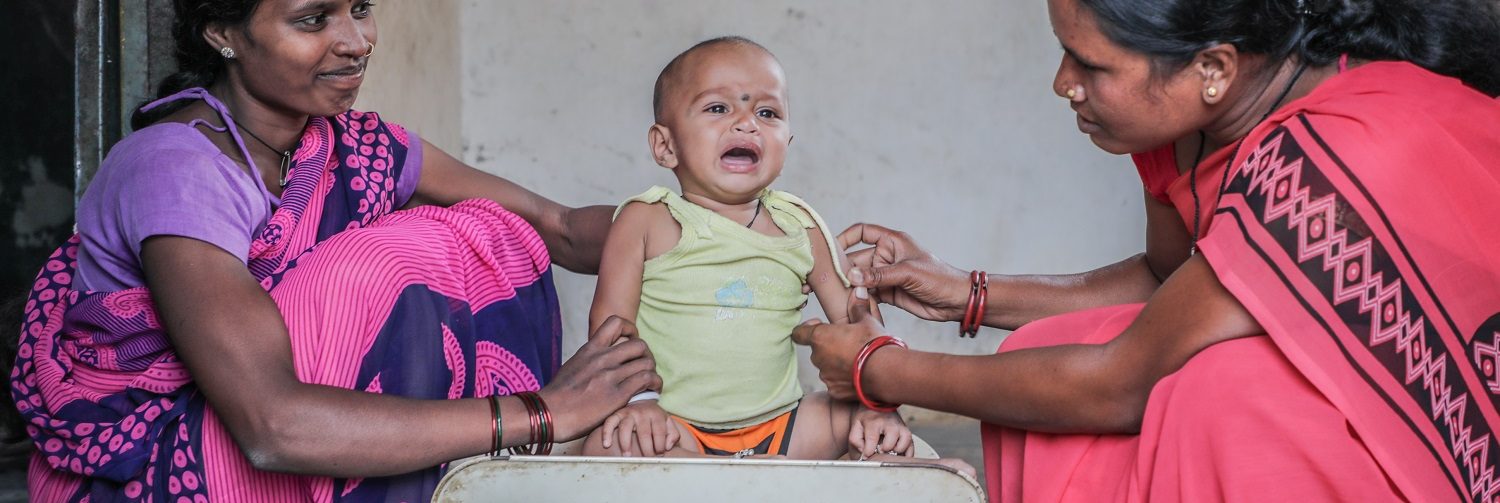The undernutrition situation in India is persistent and devastating (Visit the Global Nutrition Report website for India's country profiles). Within India’s decentralised government system there are, however, numerous programmes aimed at addressing the underlying causes of undernutrition. Yet, the extent to which these programmes contribute toward improved nutrition outcomes is dependent on effective leadership at the district level. In summer 2014 POSHAN began working with civil society organisations to explore the value of data-driven nutrition-sensitization workshops at the district level. Three partners work across three different states to convene and deliver the district level workshops: Vikas Samvad in Madhya Pradesh, Vatsalya in Uttar Pradesh and Public Health Resource Network (PHRN) in Odisha. The workshops strive toward improved understanding of the nature and severity of undernutrition at the district level and in identifying those factors might need to be addressed in order to improve the nutrition situation at the district level.
Earlier this year, POSHAN held a Technical Advisory Group meeting in which the 3 partner organisations working with POSHAN to undertake these data-driven nutrition-sensitization workshops came together with advisory group members to discuss their experiences so far.
The different ways of working of the individual partner organisations and the state context naturally resulted in variation in the nature of the meetings held. Yet discussion of the meetings held so far revealed commonalities in the issues emerging from these workshops. These included:
- Poor documentation and record-keeping practices at the district level- Data validation which is supposed to be carried out between ASHAs, AWWs, ANMs at regular meetings, does not occur, resulting in unreliable data.
- Outdated data sources- Concern that the data in the district nutrition profiles was often quite out of date (the challenges of compiling recent, robust and comprehensive data on undernutrition in India are discussed here).
- Lack of system-level performance data in the district nutrition profiles: the profiles are focused on outcome-level data at the district level, but more information is needed on program performance from monitoring systems, to enable corrective action.
It was notable that while some concerns pertaining to data were reported, these concerns did not relate to the data sharing itself. In fact, the partners’ experiences of data sharing tended to be very positive with the data itself prompting much debate and calls to action.
Here are some examples:
- A meeting convened by Vatsalya in Lucknow, resulted in an action to set up district-level monthly convergence meeting with the Chief Medical Officers (CMOs), District Programme Officers (DPOs) and Medical Officers (MOs) in charge of all blocks and Child Development Project Officers (CDPOs) to discuss health and nutrition and how to combat malnutrition in the district. Data sharing at a meeting convened by PHRN in Keonjhar district, Odisha, prompted an interest in assessing and analysing the data collected by the ICDS and the National Health Mission and triangulating between the different data sources to inform future actions in addressing nutrition concerns in the area.
- Notably it was not only high level officials who engaged with and learned from data sharing. In instances where meetings had involved frontline workers, reports of their engagement with the data were equally positive. In a meeting convened by Vikas Samvad in Balaghat, Madhya Pradesh and attended by Anganwadi workers, the data shared included statistics on newborns receiving breast milk. For Balaghat, the figures for newborns receiving breastfeeding in the first hour was very low and the Anganwadi workers pledged to be vigilant in ensuring the initiation of breast feeding within 1 hour of birth.
While it is exciting to hear how these meetings have been received, the role that the partners’ skills and experience played in any success should not be underestimated. When asked about the data sharing component of these meetings all partners spoke of the need for careful judgement in deciding which data to share, how much and in what format. They spoke about the need to encourage participants to engage with the data, to interrogate it and question their own assumptions, and how to bring about and facilitate discussion of the implications of the data for their own local area. The key message was that without skilful facilitation around the discussions of the data profiles, participants would be less likely to engage with, understand and take on board what the data was saying.

In sum, early signs indicate that sharing data at the district-level has potential as a tool to mobilize greater knowledge on what actions are needed to improve nutrition outcomes. However, in moving forward, any attempts to scale up this work should not underestimate the importance of skilful and well-established partners in enabling the success of such initiatives.
Written by: Ruth Goodman, IDS



